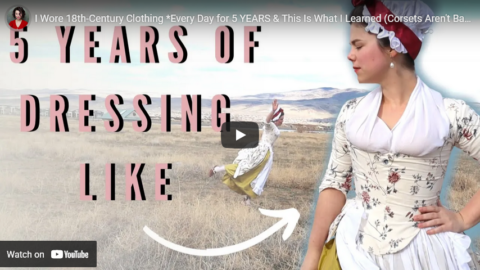Real Time History
Published 18 Nov 2021Sign up for Curiosity Stream and get Nebula bundled in and SAVE 26%: https://curiositystream.com/realtimeh…
While the Franco-Prussian War is continuing its messy guerilla phase, the German leaders are negotiating towards a united Germany. Hesse and Baden join the promptly renamed German Confederation — but Württemberg and Bavaria still want more concessions. Meanwhile the question of Spanish succession that started the war is solved in Madrid.
» THANK YOU TO OUR CO-PRODUCERS
John Ozment
James Darcangelo
Jacob Carter Landt
Thomas Brendan
James Giliberto
Kurt Gillies
Albert B. Knapp MD
Tobias Wildenblanck
Richard L Benkin
Scott Deederly
John Belland
Adam Smith
Taylor Allen
Jim F Barlow
Rustem Sharipov» OUR PODCAST
https://realtimehistory.net/podcast – interviews with historians and background info for the show.» LITERATURE
Arand, Tobias: 1870/71. Der Deutsch-Französische Krieg erzählt in Einzelschicksalen. Hamburg 2018Gouttman, Alain: La grande défaite. 1870-1871. Paris 2015
Koch, Roland : “Les canons à balles dans l’armée du Rhin en 1870” in Revue historique des armées, 255 (2009), p. 95-107.
» SOURCES
Braun, Lily (Hrsg): Kriegsbriefe aus den Jahren 1870/71 von Hans von Kretschman weiland General der Infanterie. Berlin 1911Carr, Raymond: Spain 1808–1939. Oxford: At the Clarendon Press, 1975
Deuerlein, Ernst: Die Gründung des Deutschen Reichs 1870/71 in Augenzeugenberichten. Düsseldorf 1970
Goncourt, Edmond de: Journal des Goncourts. II.1. 1870-1871. Paris 1890
Kühnhauser, Florian: Kriegs-Erinnerungen eines Soldaten des königlich bayerischen Infanterie Leibregiments. Partenkirchen 1898
Lowndes, Emma: Récits de femmes pendant la guerre franco-prussienne (1870-1871). Paris, 2013.
Meisner, Heinrich Otto (Hrsg.): Kaiser Friedrich III. Das Kriegstagebuch von 1870/71. Berlin, Leipzig 1926
N.N: + Amadeus von Savoyen in: Neue Presse v. 19. Januar 1890. S. 2
N. N. (Hrsg.): Bismarcks Briefe an seine Gattin aus dem Kriege 1870/71. Stuttgart, Berlin 1903
Schikorsky, Isa (Hrsg.). “Wenn doch dies Elend ein Ende hätte”. Ein Briefwechsel aus dem Deutsch-Französischen Krieg 1870/71. Köln, Weimar, Wien 1999
» OUR STORE
Website: https://realtimehistory.net»CREDITS
Presented by: Jesse Alexander
Written by: Cathérine Pfauth, Prof. Dr. Tobias Arand, Jesse Alexander
Director: Toni Steller & Florian Wittig
Director of Photography: Toni Steller
Sound: Above Zero
Editing: Toni Steller
Motion Design: Philipp Appelt
Mixing, Mastering & Sound Design: http://above-zero.com
Maps: Battlefield Design
Research by: Cathérine Pfauth, Prof. Dr. Tobias Arand
Fact checking: Cathérine Pfauth, Prof. Dr. Tobias ArandChannel Design: Battlefield Design
Contains licensed material by getty images
All rights reserved – Real Time History GmbH 2021
November 19, 2021
Bismarck Gets Closer To German Unification – A New Spanish King I GLORY & DEFEAT
Viewing-with-alarm … from afar
In Spiked, Simon Evans explains why he finds British commentary on US hot-button issues like guns and race to be frequently uninformed but remarkably certain of itself:

What many Brits believe every American carries in their pickup trucks or on their persons, probably.
As a Brit, there are few things less edifying, nor more unintentionally hilarious, than an American newspaper reporting on any very English scandal. A breach of some obscure royal protocol, perhaps, or an aspect of parliamentary procedure, often involving Black Rod, which despite the capital B, the Washington Post will have to explain, is not a racial epithet, or an ill-advised tribute act.
A personal favourite is when a provincial dietary preference has caught the New York Times‘ eye, having unexpectedly “caught on” nationwide. It is an innocent enough pleasure, watching Americans trying to distinguish black pudding from haggis, or indeed gravy from “chippy sauce”. Like watching the Dutch discuss the morality of bullfighting, or Korea debate a proposed rule change in top flight Buzkashi.
Yet put the sneaker on the other foot and watch British commentators angrily contend the moral and legal thrust of a case in which an American is on trial for using lethal force with a firearm, and we suffer something very like Gell-Mann Amnesia by proxy. We forget how important a little local knowledge might be, and our seasoned, tolerant, bemused respect for tradition and culture and specialist knowledge are gone within moments. Watching the Kyle Rittenhouse case approach a verdict, British commentators are a-froth with indignation at the palpable miscarriages of justice seemingly running unchecked only five short hours away across the globe. My God, he had a gun ! What more is there to say? And – do I have this right? – he crossed state lines ! The man’s a monster.
Not since the proroguing of parliament two years ago have so many people become acquainted so quickly with something so arcane as the crossing of state lines with intent to do mischief. Putting aside the fact that the weapon itself did not cross this fabled demarcation, what is striking is the evident lack of enthusiasm for certain other state lines, such as the one somewhat further to America’s south, or indeed the one etched around the British Isles, that currently seem to get crossed on a pretty frequent basis, with who knows what intent? Drawing attention to those lines is clearly racist.
It was GB Shaw who first made the observation that GB’s shores were separated from the US’s by an ocean of incomprehension, concealed by our sharing a common language.
Rather like urban Canadians, most British readers and viewers tend to agree with the opinions expressed in US mainstream media based largely in urban coastal areas:
So, we don’t get the full spectrum argument. Instead, we gratefully share the apparent horror and shame of the coastal elite, with their tertiary education and their teeth that meet in the middle, when confronted with their inland, inbred in-laws. We deplore the multi-decade epidemic of what seems, if you read the Washington Post and the NYT, to be the largely white, Wild West assassination culture that 2A concedes. Bullets sprayed around schools. Shopping malls, synagogues and mosques running with blood. A death toll out of all control. Murder, cold-blooded and cruel – and largely in the service of a bigotry, as often as not a racial bigotry, as old as the Appalachians hills.
This is, to put it as mildly as one can without choking, not quite the whole story. Do your own due diligence, it isn’t hard. The editors of the NYT can’t stop you acquainting yourself with the FBI crime statistics, and they put some of the more notorious outbreaks of flying lead into useful perspective.
But generally, we instead swallow like sugary cough syrup (believing it good for us, no matter how delicious it also is) the narrative that guns are largely in the hands and lovingly tended racks of homicidal white supremacists, paranoid death-spiral redneck survivalists, and a police force that is barely superior in discipline, racial enlightenment or legitimacy to a rounded-up posse of ad hoc lynch-happy vigilantes.
The Allied 1942 Plan to Invade Europe – WW2 Special
World War Two
Published 18 Nov 2021The second front has been opened, and Allied forces are invading Vichy French Northwest Africa. But did you know that it could very well have been an invasion of Europe taking place right now instead? Let’s examine how this idea came about, and why it never worked out.
(more…)
“We don’t even fund our search-and-rescue units properly. That’s the least controversial thing the military does.”
In The Line, Matt Gurney discusses the situation of the Canadian Armed Forces as domestic demands escalate (especially in the Vancouver area this week), and the already under-staffed units strain to meet Canadians’ needs:

“A job well done by @RCAF_ARC’s 442 Transport & Rescue Squadron. Using 3 CH149 helicopters and supported by a CC115 Buffalo, the Sqn evacuated 311 people, 26 Dogs and a Cat to safety in Agassiz after being trapped by landslides on roads in BC.
RCAF Operations, Nov 16, 2021 (https://twitter.com/RCAFOperations/status/1460664604648947721)”
If you’ve heard of General Wayne Eyre, Canadian Army, it’s probably because he’s currently the acting chief of the defence staff — that’s the top officer in the Canadian Armed Forces, in command of the army, navy and air force. He got the job after the last CDS got entangled in the sexual misconduct scandal now roiling the military. Gen. Erye stands a pretty good chance of being the next CDS on a full-time basis, assuming the government ever gets around to making a decision on that front. Given the attention the Liberals usually give the military, this is not a guarantee.
If you’d heard of Gen. Eyre before all the weirdness alluded to above, there’s a decent chance it’s because of a pretty stark warning he sounded not long ago. Interviewed by the Canadian Press, the general, then head of the army, warned that the military was simply too small to do all that was being asked of it. Specifically, he warned that increasingly frequent domestic deployments were interfering with the military’s ability to conduct large-scale, multi-unit exercises. In typical Canadian fashion, the general reached for a hockey metaphor to describe why such large exercises are essential, and told the CP, “It’s like a hockey team that would never train, never play on the ice together, and then all of a sudden being thrown into an NHL game and be expected to win.”
There are other concerns with increasing domestic deployments, which the CP noted were becoming larger as well as more frequent in line with worsening natural disasters. They exhaust personnel and wear out equipment. But the point was made — the general was telling Canadians that our world was changing, and our military was struggling to keep up. Military guys usually aren’t verbose or particularly expressive. The fact that Gen. Eyre gave this interview at all was notable on its own.
The interview was published on Jan. 20, 2020, by the way, on a day when hundreds of troops were helping Newfoundlanders dig out after a nasty winter storm. Anyone recall what else was getting underway back in early 2020?
As I write this column, I’m watching a press conference from British Columbia government officials, addressing the massive damage done by recent floods and landslides. It’s an unusually emotional press conference. That’s not a criticism, but simply an observation from a journalist who’s watched more of these than he can remember over the years. The ministers are clearly possessed by the enormity of this problem; the minister of transportation aptly described the province’s transportation network as “crippled.” Major highways and railways are either underwater or blocked by debris. Some others seem to have been partially destroyed, the ground beneath them simply gone. Many communities in B.C. are now entirely cut off from the outside world or have, at best, extremely limited access; helicopters are hauling supplies in and stranded people out. The city of Vancouver, Canada’s third largest, is essentially detached from the rest of the country unless one wants to take a huge detour through the United States, which only reopened its land border to Canadians a few days ago.
The economic toll of cutting off the Port of Vancouver from the rest of the country, at a time when supply chain disruptions are already biting hard, is going to be gigantic. Economist Trevor Tombe did some quick math and estimated it at over $2 billion a week in trade between B.C. and the rest of the country that’s just been wiped off the national GDP, not to mention the direct costs of actually fixing the damaged infrastructure, of repairing property damaged or destroyed by the tragedy and, sadly, and the massive losses to farmers in property and livestock, much of which has drowned. This is a big, big economic hit to Canada.
I Wore 18th-Century Clothing *Every Day for 5 YEARS & This Is What I Learned (Corsets Aren’t Bad!)
Abby Cox
Published 10 May 2020I wore 18th-century women’s clothing, all day, 5 days a week, for 5 years of my life. Over those 5 years, I learned *a lot* about my body, fashion in the 1700s — the good and the not so good, and how we can take these lessons and improve modern fashion.
***Trigger Warning: I do talk about body image in this video (as a reflection of my own, long, long journey with my own body & how wearing historical clothing has given me a different perspective on body image) which may or may not be upsetting for some. ***
*Ok, so not “every day” but you get the idea…
Business Inquiries *ONLY* abbycox@semaphorebrands.com
(This email goes directly to my management and not to me.)More Videos:
Answering YOUR FAQs from THIS Video: https://youtu.be/SN3agbKZVP0
“Becoming an 18th-Century MEME LORD” https://youtu.be/a0pRE3uXWu8
“Historical Costumers and Their Hogwarts Houses” https://youtu.be/vxmRsc9Qj8M
Rachel Maksy – “Born in the Wrong Era” – https://www.youtube.com/watch?v=r5GAJ…A lot of these photos of me were taken by the lovely Fred Blystone. You can see more of his photography here: https://www.facebook.com/groups/13664…
Also, @Edwardian Tailor (https://www.youtube.com/channel/UCBSf…)
We like to assume that the people in the past are “stupid” (it’s normal human behavior), and one of the ways that we, as a modern society, do this is by judging the past for their fashion trends and practices. We’ve been taught to demonize corsetry (or in this case, stays) for being restrictive and a tool of oppression towards women, and take pride in our culture of diet and exercise, without considering the issues that can be found in our body-obsessed culture. We praise jeans and a t-shirt, as being “comfortable” but the insecurities that so many of us have about our bodies are put on display in our 21st-century uniforms. We take for granted our modern homes, and how that has made us lazy in dressing for the seasons, resulting (in part) the loss of various types of textiles and weaving technology. I learned a lot over those 5 years, including how to indulge in an Indian Buffet while wearing my 18th-century stays, and I’m excited to share my insights with you. Also, can we just discuss how stupid modern underwear is??
Images Used:
*Summer Dresses, 1783, Object Number – J,5.139, Asset Number – 79588001 © The Trustees of the British Museum. https://www.britishmuseum.org/collect…
*Sheer Cottton Mull Italian Gown, 1780s, The Metropolitan Museum of Art, 17.107.6a, b, https://www.metmuseum.org/art/collect…
*Kofta, 1760s-90s, Nordiska Museet, NM.0186311, https://digitaltmuseum.se/01102369100…
*Women 1790-1799, Plate 052, Fashion Plate from August 1796, The Metropolitan Museum of Art Library Costume Institute Fashion Plate Collection, https://libmma.contentdm.oclc.org/dig…
*Robe a l’anglais c. 1780, The Metropolitan Museum of Art, 1982.291a, b, https://www.metmuseum.org/art/collect…
*Attributed to Isaac Cruikshank, Cestina Warehouse or Belly Piece Shop
April 16, 1793, The Metropolitan Museum of Art, 59.533.475 https://www.metmuseum.org/art/collect…*Stays, The Metropolitan Museum of Art,
2009.300.3330a–d
https://www.metmuseum.org/art/collect…*The Bum Shop, Attributed to R. Rushworth (British, active 1785–86), July 11 1785, The Metropolitan Museum of Art, 1970.541.12, https://www.metmuseum.org/art/collect…
*Chemise, 1780-1800s, The Metropolitan Museum of Art, 2005.368 https://www.metmuseum.org/art/collect…
*Corset, 1880s, The Metropolitan Museum of Art, 2009.300.3497a–c
https://www.metmuseum.org/art/collect…——-
Music from Epidemic Sound:
“Gold Among the Sand”- Trevor Kowalski
“To Clarity” – Airae
“The Path to Innovation” – Airae
“Caffeinated and Motivated” – Airae
“Alice is on her Way” – Airae
“Cafe Laurent” – Medite
“In a Jiffy” – Moins Le Quartet
“Moonlight Night” – Gabriel Lucas———
Instagrams: https://www.instagram.com/abbyelyn
From the comments:
Abby Cox
1 year ago (edited)Hey Everyone!
Thank you all so much for taking the time to watch this video about my experience! I’ve noticed a lot of the same questions in the comments, so I want to take a minute to answer them here –
UPDATE (Sept 27, 2020) – I’ve answered your questions about menstruation here: https://www.youtube.com/watch?v=iV2TgwjjhOE
UPDATE (June 7, 2020) – I’ve taken the most commonly asked questions from the comments and have done a video to answer them! You can watch it here: https://youtu.be/SN3agbKZVP0
– My stays (18th-century term for a corset) are from https://redthreaded.com/ – they’re a fantastic historical corset company that I adore. (and for the couple of you trying to call me out – my 100% hand-sewn, me-made, reproduction stays are so worn out that they’re in retirement, and just because I can make stays by hand doesn’t mean I have the time. I’d also rather support a small business that I believe in.
Finally, the gown I’m wearing in this video was cut to go over those stays, but if you’d like to see my hand-sewn reproduction stays in action you can buy the book I co-wrote here: https://www.american-duchess.com/book/american-duchess-guide)
– While I haven’t gone down the menstruation research rabbit hole (cause it is its own subject of study) I am going to do my best with limited access to primary source documentation (which is what I really need to be able to answer this question) to produce a video about what 18th-century women would do. I don’t know when this will be, but I will do my absolute best to answer this question, and if I can do some experimental archeology in the process, I will.
(ravenclaws gotta ravenclaw…)
– Thigh chafing – so I think that varies from person to person. I never really had a lot of issues with it (and my narrow hips mean that I will never have a thigh gap) because my linen shift would always kind of end up between my leg and absorb the sweat. However, I know a lot of costumers who will wear split-crotched drawers because they find it more comfortable, even though drawers weren’t a thing in the 18th-century.
Ok! I hope this helps answer some of your questions! Thank you all so much for watching and engaging in this video. I really can’t tell you all how much I appreciate it!

QotD: People who are interested in history versus “academic” historians
One of many reasons I never went anywhere in my career as an academic historian is that I actually like history. I find it interesting. That’s because I find people interesting, and history is, above all, the study of people and how they be.
Your average academic historian lives entirely in xzheyr own head. They hate and fear people. They have no interest in how people actually are, only in how they should be. Thus, academic history quickly devolves into the worst kind of Social Justice Mad Lib, a never-ending, ever more frantic search for ever more obscure terms to complete the equation: “Despite [barbarities], the [micro-group] were actually only doing it because they were oppressed by the Pale Penis People, because [reasons].”
For example:
This is one of those things that’s true even if it’s not true, because Clown World, but I actually looked this guy up and yeah, he’s real — he’s a “Professor of Practice in Media and Activism at Harvard University”, which is exactly what it sounds like: basically, a tenured pest, who makes very nice bank making students protest shit for class credit. The “new book” referenced in the screenshot isn’t on Amazon yet, so maybe that’s not real, but again, Clown World — even if it’s not real, it’s real, because that’s exactly the kind of thing academic historians do. You probably remember it well from your own college days, if you were in college at any time between about 1985 through 1995, the heyday of “everyone you’ve ever heard of was secretly gay!” pseudo-scholarship.
Severian, “On Boredom”, Rotten Chestnuts, 2021-08-17.









